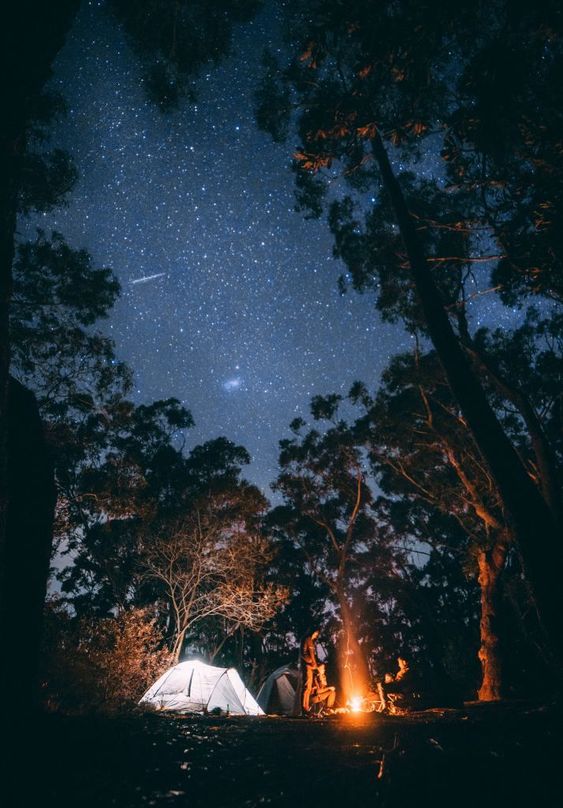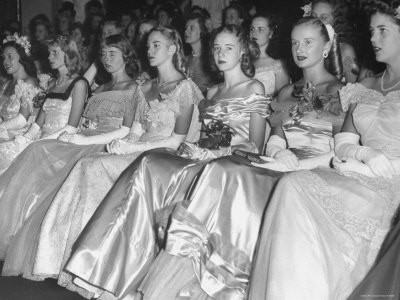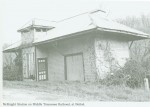The Fall Camporee, The Latest News From Watervalley

In late August the people of Watervalley, normally a trusting bunch, began to habitually lock their car doors at night. Otherwise, some neighbor would leave a bag of cucumbers and zucchini in the passenger seat. Motion detectors had thwarted the stealth dropping of veggies on the front porch, requiring the covert horticulturalists to up their game.
It’s all because of the rain.
In a typical August, Watervalley gets an average of 3.4 inches for the month. Lawns turn brown, gardens shrivel, and water bills take a pole vault. But the backyard rain gages recorded over 9 inches in one week alone. Gardens exploded.
Zucchini grew to the size of whiffle ball bats, tomato plants threw off their metal cages, and watermelon vines began to wrap around slow-moving children.
And the humidity was so unbearable that even some of the staunchest anti-evolution Baptist thought that having gills might just be okay.
The downpours also permeated other matters of town life. Sanctuary attendance at Watervalley First Presbyterian has recently dropped to around twenty. The rain received the blame but in truth, people had become rather comphy sipping coffee in their pjs and catching the sermon over the internet. And for the righteous remnant that did attend, the experience was a mixed blessing. With so few people in the sanctuary, the sermons began to feel rather personal.
The Fall Boy Scout Camporee also happened during this time. Oscar Lambright, the Scoutmaster of Troop 111, had eight boys in the troop this year. Oscar was a small, stern man with black-rimmed glasses and flat top haircut. He had edged past seventy but still walked with a crisp gait and a flagpole-straight back. A retired accountant, he was neat, orderly, and the torchbearer of ancient scouting tradition. At every meeting and event, he was in full uniform including his sash smothered with badges, awards, and Order of the Arrow insignia. Along with his well-starched demeanor, he always carried a clipboard with him containing inspection check-off sheets for uniforms, proper tent assembly, and fire safety. Oscar lived for the camporees.
Despite his somewhat nasally voice and his complete void of humor, the scouts liked him. He was steady and knowledgeable and never lost it despite whatever shenanigans the boys invented. Besides, they were fascinated when he talked. Not with his words but with his Adam’s apple which grandly protruded and bounced like a golf ball in a sock. And if that weren’t enough, apparently Oscar had overly productive salivary glands because small strings of spit would form in the corners of his mouth, looking like a cave with stalagmites. Notably, the threshold of thrill for eleven-year-old Watervalley boys was rather low.
Given the number of scouts, Oscar had asked Hoot Wilson to volunteer and help out with the camporee. In years gone by, Hoot had been an Eagle Scout. In fact, Oscar had been his Scoutmaster. With some reluctance, Hoot had agreed to come along. He still had his backpack, sleeping bag, and tent, but his uniform was four belt notches ago. He would forego that scouting detail and wear camo instead. His wife, Karen and daughter, Wendy prompted him along, insisting that along with the hired help, they could get the cows milked and fed. Quietly, they had already planned a weekend binge of the Gilmore Girls. Hoot decided it would be a good change of pace.
However, for Hoot, keeping up with the pace turned out to be the first of many hurdles. There was a two-mile trail through the woods to the camporee site. But nearby there was also an old dirt road; a road where Hoot could simply drive his truck, park, and unload his multiple creature comforts. None the less, Oscar insisted that real scouts hiked in on the trail. So, in a spirit of solidarity, Hoot left his folding chair, his cooler, and some cooking gear in order to get his pack down to welter weight status.
He took up the rear guard and was in stride for the first quarter mile. Then the trail began to rise. After another half mile, Hoot was on a quest for oxygen. Moreover, every inch of his 300 plus pounds was now bathed in sweat. Along with Hoot, several of the boys were feeling the discomfort of the heat, the weight of the packs, and the consequences of poorly tied boots. Nor were they inclined to suffer in silence. Oscar was at the front, nimbly clipping along, oblivious to the storm of woe brewing behind him.
One scout, a rather pink and chubby fellow, was having a particularly hard time of it. He had started at the front of the line but one by one the other boys had passed him. Now he was last, save for Hoot. With every step his grunts and whimpers would crescendo ever louder. He finally turned around and pleaded with Hoot to stop for a while. The little fellow’s face melted as he talked, choking his words out, seemingly on the verge of tears. Hoot could hear the snickers of the other boys up ahead, winking and whispering with telling nods toward the back of the line. The big man could feel his blood pressure rising. This wasn’t scouting. Scouting was helpful, courteous, kind.
He spoke in a low, firm voice. “Simmer down up there boys.”
This censored the badgering for a short distance. But the pink and pudgy scout wasn’t helping. His impish, desperate moans were in rhythm with every plodding step. By subtle measures, the darts of smirks and giggles escalated once again. Hoot was furious. For a brief moment, he had the fleeting notion that punishment by caning should be reinstituted.
He’d had enough. He stepped forward and put his hand on the boy’s shoulder. “Let’s you and me stop here for a moment, whaddya say?”
The boys just ahead turned and looked back. Hoot motioned them with his hand. “You fellows just keep going. We’ll catch up.”
They both dropped their packs and sat on a nearby log. While getting a drink of water, Hoot noticed the that the little fellow’s pack was nothing more than an Army bag with two canvas straps and no metal frame for support. It hung on him like a sack of potatoes. No wonder the boy was struggling so much. Hoot offered him some water which he swallowed in large gulps.
“What’s your name there, buddy?”
“Leonard.”
“Well, Leonard. Welcome to scouting. Sometimes the going gets rough. But we stick together and tough it out.”
Wearing a solemn face of anguish and defeat, the boy said nothing. He simply nodded his head lightly and looked away. And in that moment, an undemanding breeze swept along the path. It brought to Hoot memories of his early scouting days. He wasn’t so different from the boy; always chubby, unsure, feeling like an outsider. In those days, Scoutmaster Lambright had stepped in numerous times along the way to help and assist. Hoot decided it was his turn.
“Come on, young fella. Let me see your bag.” He took the canvas pack, which was noticeably heavy, and used the straps to tie it to the back of his own pack. Then, with some effort, he hoisted both packs on his back. The boy said nothing, quietly acknowledging Hoot’s actions. They set out to cover the last mile which, unfortunately for Hoot, was all uphill.
After forty minutes and two more stops at the boy’s insistence, they approached the camporee site. Hoot stopped behind a tree. “Here Leonard. Let’s put your pack back on you and you carry it the rest of the way. Nobody needs to know the difference.”
Oddly, the portly young scout seemed disappointed at first. Then he shrugged and took the pack. His requirement to whimper with each step resumed. Finally, they arrived at the Troop 111 campsite and dropped their loads. The boys were busily putting up tents with Oscar dogmatically circling them and ceremoniously checking items off on his clipboard.
Hoot stepped around a nearby tent and across the way to speak to Oscar when he heard one of the boys behind him speak in an amused whisper. “Hey, Leonard. Did you get the big guy to carry your pack for you?”
This was followed by low gush and snigger. “Sure did.”
Hoot paused, thought, walked back around the tent, and then stood silently. He glared at the boys with smoldering intensity. What he saw made him practically combust. Leonard, the chubby scout, was in the process of unloading two six packs of 20oz Mountain Dews from his bag; the bag that Hoot had carried for the last mile. Hoot’s nostrils flared and his eyes emanated a strange orange glow. He had been duped, laughed at. For a fleeting moment, he thought about how nice it would be to plug this little miscreant and strap him to the hood of his truck.
One by one the boy’s gleeful faces withered to a speechless, open-mouthed terror. Hoot sullenly focused his gaze on each of them; his lips pursed, his great chest swelling in and out. He walked over to Leonard and with one large paw, grabbed both Mountain Dew six packs. He proceeded to open each bottle and pour it out on the ground, with a face that dared anyone to say anything.
No one did.
When he finished. He spoke in a low, cool voice. “Get your tents set up boys. And then go gather some firewood. Leonard, go get yourself some water at the Canteen. I’ll be back to check on all of you in twenty minutes.”
Hoot grabbed his gear and looked around for Oscar. He paused a moment to gather his resolve. He was crestfallen. He didn’t like being the heavy. The hike in was agonizing enough. But his sole reason for coming was to connect with the boys; to have a spirited and enjoyable time teaching them all about scouting. He exhaled and walked down the tent line. That’s when he discovered his next surprise.
At the end of the row of tents was Oscar, standing in front of a large canvas Baker tent complete with a covered porch and a sizeable inner chamber. Visible inside the unzipped door was an elevated wooden cot with a mattress. Multiple coolers and camping gear were stacked neatly around the perimeter. Hoot noticed Oscar’s backpack with the top flap open. Inside was nothing more than a pillow. Oscar had clearly driven up earlier in the day, set up camp, and then drove back to the assembly area to hike in. Hoot felt a mixture of annoyance and stupidity.
On top of the exhausting hike and being at lousy ends with the boys, his arrival with only the bare essentials was completely unnecessary. Hoot was dumbfounded. Oscar didn’t notice.
“Sawyer,” he said, calling Hoot by his given name, “Better get your tent set up.” He folded his clip board under his arm and headed up the tent line.
Hoot shrugged and chose a spot a few feet down from the Lambright Ritz Carlton. Now, he realized the next revelation that the Camporee Gods had in store. He untied the nylon tent bag from his pack and began to unsheathe it. As he pulled it out, a horrific memory flooded his head. He had forgotten. His teenage daughter Wendy had asked to borrow his tent earlier in the spring for a sleepover at a friend’s house. So, when Hoot pulled out the contents of the tent bag, it wasn’t his North Face Sequoia tent complete with hybrid double wall construction, large vestibule, ceiling pockets, and easy fit rain fly. Instead, it was Wendy’s “My Little Pony,” tent from when she was in the third grade. She had mistakenly put her old tent in the wrong bag.
Immediately, Hoot looked around to see if anyone had noticed. He quickly stuffed the tent back in the bag. Maybe he could put it up after dark he thought. He shook his head. After a further moment’s contemplation, he decided to simply stow his gear next to Oscar’s tent for now. There was no rain forecasted until the following afternoon. Maybe he would just sleep under the stars.
He grabbed his cooking gear and food and made his way back toward the boy’s tents. Upon his arrival he noticed that not a stick of firewood had been gathered. Half of the boys were having a marshmallow fight and the others were inside one of the tents where suspicious whispers were followed by bursting laughter. Oscar was nowhere to be found.
“Alright. Every one of you Troop 111 scouts. Out here, right now. In formation and at attention.” The weight of his voice struck terror. They moved as if a grenade had been tossed in the middle of them. They assembled in two rows of four with stomachs in and shoulders back. Several of them were spontaneously saluting. Only one was in full uniform.
Hoot spoke in a steady, firm voice. “Boys, we need firewood. Now I want all of you to go to the woods over there and pick up dead limbs. Watch out for poison ivy. That’s it. Take off.”
Not a single scout moved. Sideways glances passed between them. Finally, one of them raised his hand. “Sir, if we didn’t bring anything to cook, do we still have to gather wood?”
“What did you bring to eat?”
“My mom made a pbj sandwich for me and I brought a can of Pringles.”
Another scout joined in. “My mom packed two lunchables and I’ve got a big bag of Cheetos.”
For a moment, Hoot stared at them blankly. “How many of you actually brought something to cook?”
Only the one scout in full uniform raised his hand.
Hoot folded his arms and exhaled, contemplating. “Tell you what. Yeah. I want each one of you to go gather some firewood. Knowing how to properly build a fire is fundamental to scouting. So, go, and bring back plenty of twigs.”
The boys broke ranks and moved in a somewhat organized clump toward the nearby woods. That was, except for the one scout who had brought something to cook. He headed back up the tent line and then vanished over a small rise. Hoot started to call him back but thought better of it.
He went back to Oscar’s Taj-Tent Mahal and grabbed a small shovel to use in digging the firepit. Oscar was still nowhere to be found.
He excavated the firepit and then noticed that some of the tents needed adjustments. He finished these modifications and then picked up the scattered marshmallows left from the earlier skirmish. Half an hour had passed and none of the boys had returned. In the western sky a change of light foretold the first hint of sunset. After ten more minutes, Hoot set out for the woods. Soon enough, he found them. They had come across a black walnut tree, chosen sides, and were in the thick of heaving green walnuts at each other. Some had used the brown sap from the outer shell and painted war stripes on their faces.
In short order, Hoot had them lined up and loaded up. They walked single file back to the campsite. Along the way, he noticed that there were only seven of them.
“Where’s the scout who was in his uniform?”
One of the taller boys spoke up. “That’s Clayton Suggs. We haven’t seen him.”
“Is that Joey Suggs boy?”
“I think so. I’m not sure.”
Hoot knew Joey. They had gone to school together although Joey was a couple of grades behind him. Joey worked for the county driving a garbage truck. To Hoot’s thinking, he was “good people,” albeit, not a man of means. He lived in one of the modest row houses behind the Farmers Co-op. Having made the connection, Hoot was certain of it. The boy was thin and wiry but with a certain sinewy toughness, pretty much the spitting image of his dad at that age.
When they arrived back to camp, Hoot noticed a sizeable stack of firewood already sitting beside the firepit. A moment later, the Suggs boy appeared over the rise with another full arm load of wood. They were of uniform length with the ends squarely cut. He dumped them on the existing pile, brushed his hands together, and spoke to Hoot in a declarative voice.
“Them boys at the next campsite ain’t very nice.”
Hoot looked at him curiously. “How so?”
“I found this stack of firewood just outside their campsite and when I began to gather it up, they raised a stink.”
“You think maybe it was their firewood?”
“That’s what they claimed. But I don’t believe them.”
“And why’s that?”
“Unless they were packing a chainsaw, they didn’t have nothing to do with that wood being there.”
Hoot chuckled under his breath. The boy clearly didn’t think he was stealing the wood and was hurt at the other troop’s lack of generosity.
“So, what happened to change their mind.”
“I took a branch and walked right up to the biggest one and told him he’d have a hard time explaining how a little piss-ant like me broke his arm.”
Hoot’s eyes went wide open. He gushed a laugh. “What’d he do next?”
“He helped me load up the first load.”
Hoot shook his head, irrepressibly amused. The boy spoke further. “Even if it was theirs, they had a whole rick. I barely put a dent in it. Besides, the Scout Law says to be helpful.”
Hoot shrugged and let the matter pass, even though the boy’s actions were a closer shade of help-yourself rather than helpful. Clayton reminded Hoot of his dad, Joey; an amiable, likeable fellow who, when need be, could whip his weight in wildcats.
Hoot got a fire going while along the way explained each step to the boys. Surprisingly, they were quite attentive. When enough coals were available, they watched with great interest as Hoot wrapped a healthy amount of vegetables and chopped up steak in several layers of aluminum foil and buried them in the coals. He told the boys this was called hobo stew. Meanwhile, Clayton asked Hoot if he could borrow a cooking pot. Hoot went to Oscar’s tent and found one….still not finding Oscar.
Clayton brought out two large cans of Dinty Moore Beef Stew, dumped them into the pot, and then carefully placing it on the coals. He gathered a good size stick, whittled the end of it down, and used it to stir. Dinty Moore wasn’t exactly gourmet caliber, but in the slight chill of twilight, it had an aroma of heaven. And the other boys, who had long since finished their cold sandwich and chips, began to look on rather longingly. Hoot took notice. He got an idea.
His dinner in the coals was almost done. He fished it out and then began to methodically dump it in the large pot with Clayton’s stew. He spoke as he did so. “Clayton, what say we combine dinner here and see what we got.”
The young scout seemed unaffected. “Sure.”
Hoot completed the task. “Man, I tell you what, we got a lot of food here. If any of you boys want some, grab your tin camping cup and I’ll spoon a little out.” The line formed immediately.
Everybody, including Hoot, got their fill. Afterward, some of them offered Hoot some of their Little Debbie snacks in exchange. The mood lightened and darkness enveloped them. One of the boys asked Hoot about his scouting days and if he had any stories about Mr. Lambright.
Hoot had more than a few and gladly told them. All the while, he kept expecting Oscar to appear out of the darkness. He never did. Hoot was beginning to worry.
After another hour passed, Hoot told the boys that it was time for lights out and to go to bed. This time, they obeyed without question.
He made his way back to Oscar’s tent. To his relief, as he approached, he heard the unmistakable sound of Oscar’s snoring. He was a little perturbed but relieved.
Using a small flashlight, he grabbed his sleeping bag. For a moment, he thought about clearing out a spot in Oscar’s tent. But the snoring could have been measured on the Richter scale. He opted to move toward the edge of the nearby woods, found a level spot, rolled out his bag and was soon asleep.
He was blissfully unaware that at the far end of the county, hell was yawning.
The first drops had sharp edges, stinging. There was a moments reprieve as the wind gusted everything aside. Then it came, louder, stronger, fiercer. By the time Hoot had his boots on, he was soaked. Thunder cracked in the distance. Under what was now a full-blown downpour, Hoot gathered his bag and, with his small flashlight, ran as best he could to Oscar’s tent.
While the deafening rain pounded the top of the tent, Hoot found Oscar just as he had left him, sleeping blithely unaware. Hoot gave him a small but firm shake. Oscar stirred, but nothing more. Hoot repeated. Still nothing. That’s when he saw it, barely protruding from under the edge of Oscar’s mattress. It was a flask and, as it turned out, an empty one. Oscar had untethered all ties to earth. He was passed out drunk.
He had little time to contemplate the matter. From outside the tent, he heard a voice.
“Mr. Wilson, are you in there?”
Hoot tucked the flask into one of Oscar’s bags. “Yeah, just a second.”
He stepped out. Four of the boys, drenched to the bone, were standing under the protection of the covered porch area. “Mr. Wilson, there’s like a river running through the middle our tent.”
Before Hoot could respond, three more of the boys appeared out of the darkness, looking even more drowned than the first group. They crowded under the porch flap. A half minute later, the last one appeared. It was Clayton. But, unlike the others, he was wearing a plastic poncho.
A litany of moans rose up. Some wanted to call their parents, some wanted to go home, all wanted to get out of the storm.
The thunder roared. The rain continued to fall in sheets, relentless. The boys all focused on Hoot, searching for an answer. Hoot pursed his lips and nodded.
“Who had the highest rank here?”
Oddly, it was Leonard who spoke up. “That would be Clayton. He’s a Star Scout.”
Hoot looked squarely at him. “Clayton, I’m going to go figure a way out of this mess. While I’m gone, you’re in charge. Stay here, but don’t make a lot of noise and don’t bother Scoutmaster Lambright. He’s not feeling well. You all got that?”
There was a chorus of yesses.
Hoot dug around briefly in Oscar’s troop bags and found a poncho. He knew what he had to do. He pulled the poncho over him, checked his flashlight, and stepped away into the darkness. He would take the dirt access road back to the parking area, get his truck, and somehow retrieve the boys out of storm. He found the muddy lane and within minutes was engulfed in darkness and the accompanying misery.
The thunder, the lightning, the pelting rain; it all became surreal. What had he been thinking? It seemed that all of it had been a disaster. And what in the world was going on with Oscar? How had it come to this; exhausted from lack of sleep, walking through mud, in the dark, under a punishing deluge. He had simply wanted a quaint, nostalgic, fall campout to revisit some of his best memories of scouting.
Then the thought occurred to him. Some of his best memories of scouting were just like this, best laid plans and resultant disasters. Overturned canoes, accidental tent fires, and bears that wanted to share your dinner. Sure, everyone was frazzled, soaked, and perhaps even a little bit scared. But they would get through it. Hoot had new resolve, a plan. He picked up his pace.
Soon afterward, by God’s grace, headlights appeared behind him. He caught a ride to his truck and made his way back down the road. The rain never stopped.
He found the boys huddled in silence under the porch of Oscar’s tent, just as he had left them. He told them to throw all their gear and packs and tents wholesale into the back of the truck. This they did with amazing efficiency. Hoot decided to leave Oscar to his slumber. Then, with a little effort, he squeezed all the boys into the front of his king cab truck. Perhaps not the safest solution, but what other choice did he have. Hoot drove slowly.
When they reached the highway, cell phones began to ping… messages from concerned parents. Hoot took stock of the time. It was 11:15.
“Boys, I want you to text your parents and tell them that you are spending the night in Sawyer Wilson’s hay barn. Tell them you’re fine and will call them in the morning.”
Somehow, this news brought a bit of energy to the group. A mirthful air began to spread among them escalating into declarations to “move your arm,” and “what’s that smell,” and a litany of other pronouncements followed by an explosion of laughter. They arrived at Hoot’s barn in good spirits. They changed to their driest clothes while Hoot made beds in the straw with horse blankets and burlap bags. None of them seemed to care. Within thirty minutes, they were all fast asleep.
In the morning, Hoot took them up to the house and cooked them a big breakfast of pancakes and bacon. Karen was delighted to have all to boys and all the boys were delighted to be in the near company of Hoot’s seventeen-year-old daughter, Wendy, who had blossomed into a stunning beauty.
By 10:00 AM, all the boys had been picked up. With the arrival of every parent, it seemed that each boy exploded into enthusiastic words about what an incredible, fun time they had. Hoot couldn’t believe it. He just scratched the back of his head and smiled with every compliment and thank you.
Perhaps it had been a load of fun. Just not for him. But then again, that was the point wasn’t it, he thought. Scouting had been some of his best memories. But he wondered if they had always been fun for Oscar; if he saw all the years that he had given of himself through the same carefree lens that Hoot did. Hoot knew the answer and he knew that he needed to go see Oscar that afternoon.
He left his old scoutmaster’s house a little after 3:00PM. His conversation with Oscar confirmed what he had already suspected. Oscar was having occasional bouts of dementia. It was somewhat mild at present. But it would get worse. Oscar knew this. And in his depression, he tended to drink. Even when he shouldn’t.
Hoot had gone there knowing something else and he broached it with Oscar before his old leader had the chance to ask. Hoot would be the new scoutmaster of Troop 111.
As he drove down narrow lane back to the farm, Hoot pursed his lips with a quiet resolve. Wendy would soon be out the door, Karen had her veterinary practice, and he had plenty of help to milk the cows. Besides, at days end, Hoot really loved scouting. And, he had to admit, he and the boys had had quite an adventure. He turned down the long gravel drive and smiled, He couldn’t wait for the next one.
For now, that’s the news from Watervalley.
Until next time!










